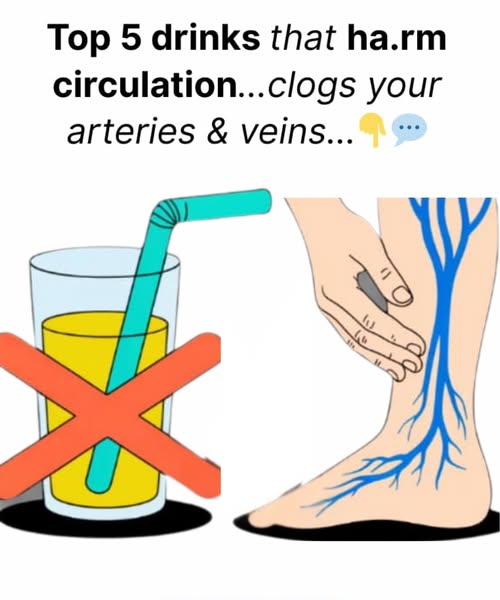
Circulatory health is critical to overall well-being, yet many related illnesses develop quietly, causing damage long before noticeable symptoms appear. Conditions like high blood pressure are especially dangerous because they silently strain the heart, weaken blood vessel walls, and increase the risk of severe complications such as heart failure, chronic kidney disease, and atherosclerosis.
Atherosclerosis—the gradual buildup of plaque in arteries—narrows blood flow and can trigger life-threatening events such as heart attacks, strokes, and pulmonary embolisms. These events often occur without warning, making prevention through lifestyle choices even more important.
While many people focus on diet and exercise for heart health, what we drink is often overlooked. Beverages can either support or sabotage our circulatory system in subtle but powerful ways.
Sugary drinks are among the most harmful culprits. Sodas, sweetened teas, flavored waters, energy drinks, and store-bought lemonades contain high levels of sugar and, in many cases, added sodium. Excess sugar intake is directly linked to obesity, insulin resistance, and the development of type 2 diabetes—all major risk factors for cardiovascular disease. In fact, studies show that even consuming one sugary beverage per day can significantly increase the risk of heart attacks and strokes.
Instead of reaching for these sugary options, consider switching to water, which keeps the blood thinner, supports kidney filtration, and aids in maintaining healthy blood pressure. Herbal teas like hibiscus, green tea, or chamomile are also excellent choices, offering antioxidants that support artery flexibility and reduce inflammation. Unsweetened vegetable or fruit smoothies (with the fiber intact) are a more nutritious option than juices.
Alcohol, another common beverage, deserves careful attention. While moderate red wine consumption has been associated with potential cardiovascular benefits (thanks to antioxidants like resveratrol), excessive drinking poses far greater risks. Chronic heavy drinking raises blood pressure, weakens the heart muscle (a condition known as alcoholic cardiomyopathy), increases triglyceride levels, and disrupts essential nutrient absorption. Moreover, it raises systemic inflammation and is linked to certain cancers. Experts advise limiting alcohol to no more than one drink per day for women and two for men to minimize these risks.
Fruit juices, often marketed as “healthy,” can also be misleading. Even 100% fruit juice lacks the fiber found in whole fruits and causes rapid blood sugar spikes, which over time can damage blood vessels and encourage plaque buildup. Rather than drinking juice, it’s better to eat whole fruits or blend them into smoothies that retain pulp and fiber.
Highly caffeinated beverages such as energy drinks and some specialty coffees can also be harmful if consumed excessively. Large amounts of caffeine can elevate blood pressure, interfere with sleep cycles, and cause irregular heart rhythms. Many of these drinks contain hidden sugars and syrups, adding to the cardiovascular burden. While moderate coffee consumption (without excessive sugar and cream) may offer some protective benefits, moderation is key.
Surprisingly, artificially sweetened beverages—though free of calories—aren’t entirely safe either. Research suggests they may disrupt gut bacteria, contribute to insulin resistance, and potentially increase cravings for sweet foods. Over time, these metabolic changes can indirectly harm heart health. If you’re looking for low-calorie options, natural sweeteners like stevia or monk fruit are wiser choices when used sparingly.
Beyond simply cutting harmful drinks, hydration plays a critical role in circulation. Staying properly hydrated helps maintain adequate blood volume, supports healthy blood pressure, and prevents the blood from becoming too thick (which can increase the risk of clots).
Ultimately, small changes in your daily beverage habits can make a profound difference in your long-term circulatory and heart health. By choosing drinks that nourish and support your vascular system rather than strain it, you help safeguard your body against silent but serious threats. Embracing water, herbal teas, whole-fruit smoothies, and minimal alcohol can set the foundation for a healthier, more resilient cardiovascular system.


